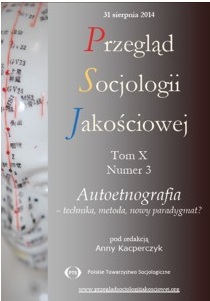Autoetnografia – technika, metoda, nowy paradygmat? O metodologicznym statusie autoetnografii
Autoethnography – Technique, Method, or New Paradigm? On Methodological Status of Autoethnography
Author(s): Anna KacperczykSubject(s): Social Sciences
Published by: Uniwersytet Łódzki - Wydział Ekonomiczno-Socjologiczny
Keywords: analytic autoethnography; evocative autoethnography; techniques of data gathering; method of social research, paradigm; participant’s perspective
Summary/Abstract: The goal of the paper is an introduction of conceptual order to existing categories of autoethnography research. The author tries to reconstruct dimensions in which autoethnography is used in contemporary social investigation basing on the review of studies referring to autoethnography. She distinguishes three levels on which autoethnography is applied: (1) the level of techniques of data gathering, (2) the level of investigation method or strategy, (3) the epistemological level referring to philosophy of social research in which autoethnography appears as new paradigm of social research. The reasons of great popularity of autoethnography come from metamorphosis of the humanities itself (after postmodern turn and performative turn). The author discusses reasons of necessity to appeal to approach of “participant’s perspective” in the social sciences. She specifies denotations of the term “autoethnography” with reference to history of its applications and enumerates conditions of critique referring to this kind of investigation practice. Discussing methodological status of autoethnography, the author indicates fundamental paradigmatic split between analytic and evocative autoethnography, which separate these two worlds of research practices. The first one is marked by scientistic and excessively intellectual agenda of reality description. The second one accents emotional, intimate involvement and embodied participation into the collaborative process of knowledge creation.
Journal: Przegląd Socjologii Jakościowej
- Issue Year: X/2014
- Issue No: 3
- Page Range: 32-75
- Page Count: 43
- Language: Polish

